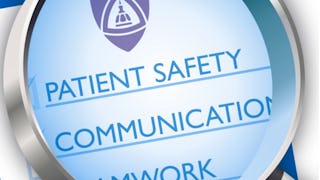Filter by
SubjectRequired
LanguageRequired
The language used throughout the course, in both instruction and assessments.
Learning ProductRequired
LevelRequired
DurationRequired
SkillsRequired
SubtitlesRequired
EducatorRequired
Explore the Safety Course Catalog
 Status: Preview
Status: PreviewCoursera Instructor Network
Skills you'll gain: Occupational Safety and Health Administration (OSHA), Safety Training, Occupational Safety And Health, Health And Safety Standards, Compliance Management, Regulatory Compliance, Safety Culture, Job Safety Analysis, Labor Law
 Status: Free Trial
Status: Free TrialUniversity of California, Davis
Skills you'll gain: Chemical Engineering, Hazard Communication (HazCom), Failure Analysis, Process Engineering, Electrical Safety, Safety Assurance, Risk Analysis, Occupational Safety and Health Administration (OSHA), Fire And Life Safety, Environment Health And Safety, Engineering Practices, Chemistry, Risk Management, Accident Prevention, Risk Mitigation, Process Control, Health And Safety Standards, Systems Analysis, Process Analysis, Safety and Security
 Status: Free Trial
Status: Free TrialJohns Hopkins University
Skills you'll gain: Patient Safety, Data Presentation, Change Management, Performance Measurement, Design Thinking, Systems Thinking, Quality Improvement, Planning, Safety Assurance, Nursing Management, Continuous Quality Improvement (CQI), Health Systems, Corrective and Preventive Action (CAPA), Safety Training, Adaptability, Accident Prevention, Health Care, Project Planning, Communication Strategies, Continuous Monitoring
 Status: Free Trial
Status: Free TrialUniversity of California, Davis
Skills you'll gain: Chemical Engineering, Failure Analysis, Process Engineering, Safety Assurance, Risk Analysis, Engineering Practices, Risk Management, Systems Analysis, Process Analysis, Safety and Security, Estimation, Reliability
 Status: Free Trial
Status: Free TrialUniversity at Buffalo
Skills you'll gain: Safety Training, Electrical Safety, Environmental Regulations, Occupational Safety and Health Administration (OSHA), Fire And Life Safety, Hazard Communication (HazCom), Health And Safety Standards, Environment Health And Safety, Safety and Security, Energy and Utilities, Emergency Response, First Aid
 Status: NewStatus: Preview
Status: NewStatus: PreviewCoursera Instructor Network
Skills you'll gain: Accountability, Team Leadership, Leadership, Motivational Skills, Business Leadership, Employee Engagement, Performance Management, Team Building, Organizational Effectiveness, Professional Development, Emotional Intelligence, Safety Culture, Self-Awareness, Communication Strategies
What brings you to Coursera today?
 Status: NewStatus: Free Trial
Status: NewStatus: Free TrialUniversity of Alberta
Skills you'll gain: Conflict Management, Diversity and Inclusion, Stress Management, Resilience, Leadership and Management, Mental Health, People Management, Personal Development, Leadership, Business Leadership, Team Leadership, Culture Transformation, Self-Awareness, Cultural Diversity, Trustworthiness, Employee Engagement, Professional Development, Emotional Intelligence, Empathy, Communication
 Status: Free Trial
Status: Free TrialL&T EduTech
Skills you'll gain: Fire And Life Safety, Pump Stations, Building Codes, Process Flow Diagrams, Construction Inspection, Hydraulics, Plumbing, Blueprint Reading, Safety Assurance, Electrical Systems, Building Services Engineering, System Monitoring, Building Design, Systems Analysis, Engineering Drawings, Facility Management and Maintenance, Water Resources, HVAC, Threat Detection, Construction
 Status: Free Trial
Status: Free TrialSkills you'll gain: Energy and Utilities, Environmental Engineering, Hazard Communication (HazCom), Safety Assurance, Accident Prevention, Failure Analysis, Failure Mode And Effects Analysis, Risk Analysis, Environmental Regulations, Plant Operations and Management, Risk Management, Environment and Resource Management, Waste Minimization, Electric Power Systems, Control Systems
 Status: Preview
Status: PreviewThe George Washington University
Skills you'll gain: Patient Safety, Clinical Leadership, Health Care Administration, Safety Assurance, Continuous Quality Improvement (CQI), Health Care, Health Systems, Quality Assurance, Data Quality, Human Factors (Security), Systems Thinking, Change Management
 Status: Preview
Status: PreviewCoursera Instructor Network
Skills you'll gain: Empathy, Diversity Equity and Inclusion Initiatives, Overcoming Obstacles, Courage, Resilience, Compassion, Teamwork, Empowerment, Collaboration, Constructive Feedback, Relationship Building, Innovation, Interpersonal Communications, Active Listening
 Status: Free Trial
Status: Free TrialUniversity at Buffalo
Skills you'll gain: Electrical Substation, Electrical Power, Electric Power Systems, Electrical Systems, Safety Training, Electrical Safety, Basic Electrical Systems, Environmental Regulations, Occupational Safety and Health Administration (OSHA), Fire And Life Safety, Hazard Communication (HazCom), Health And Safety Standards, Energy and Utilities, Workforce Development, Economics, Environmental Issue, Transportation Operations, Natural Resource Management, Construction, Continuous Monitoring
In summary, here are 10 of our most popular safety courses
- Introduction to OSHA: Safety Standards and Compliance: Coursera Instructor Network
- Chemical Hazards and Process Safety: University of California, Davis
- Patient Safety: Johns Hopkins University
- Introduction to Process Safety and Risk Analysis: University of California, Davis
- Safety in the Utility Industry : University at Buffalo
- Results-Driven Leadership for High-Performing Teams: Coursera Instructor Network
- Workplace Psychological Health and Safety: University of Alberta
- Fire and Life Safety Systems: L&T EduTech
- Utilities, Safety & Environmental Care in Oil & Gas Industry: L&T EduTech
- Leading Healthcare Quality and Safety: The George Washington University










